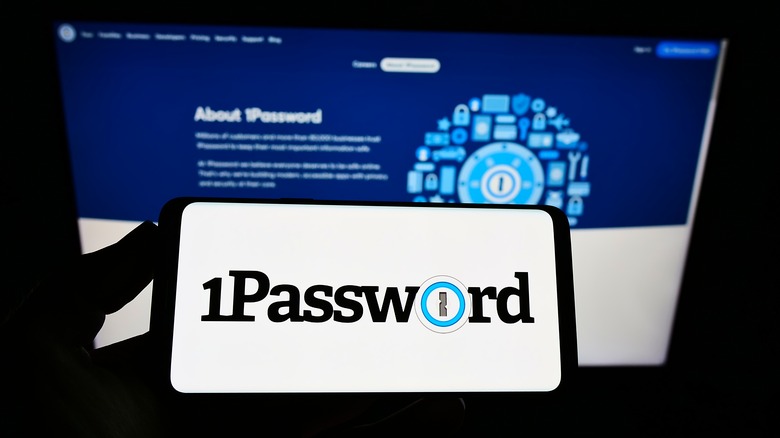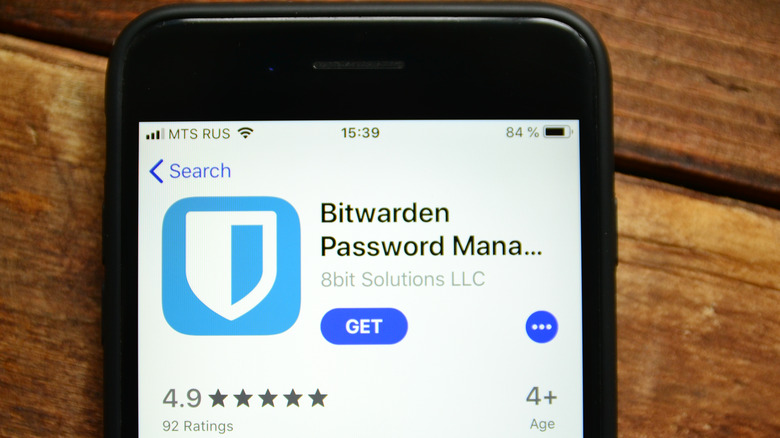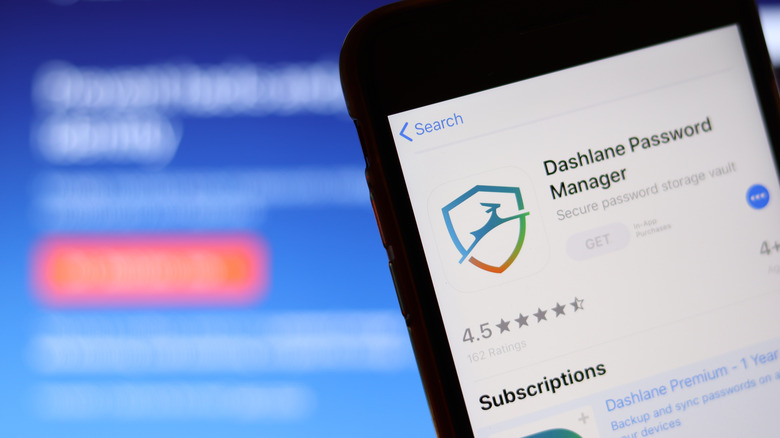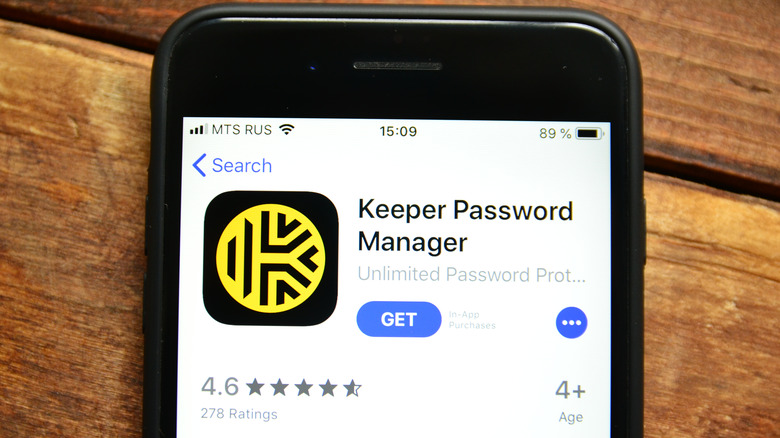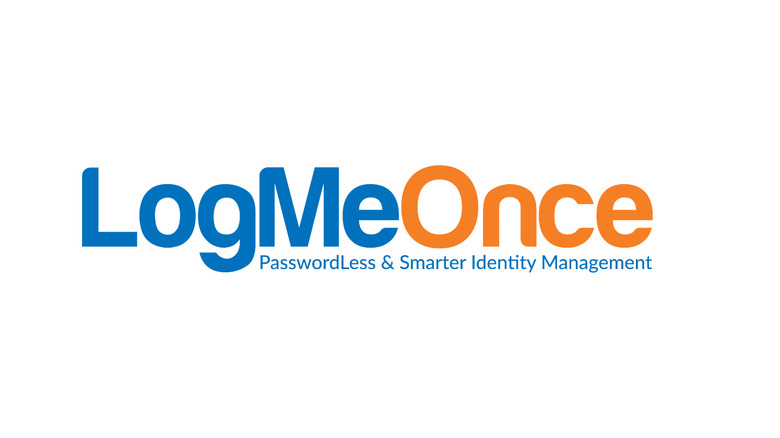5 Of The Best Password Managers For iPhone In 2023
You need different passwords for each of your online accounts for the same reason you need separate keys to protect your real-life valuables. You wouldn't use one master key for your house, car, and safe because that would make it too easy for thieves to break into all three if they ever laid hands on the key, right?
But data from NordPass says the average internet user has about 70-80 password-protected online accounts to their name, and it's downright impossible to commit that many passwords to memory. It's like having one hundred keys — soon enough, you start losing track of which opens what. Here's where password managers come in.
The best password managers save you the hassle of creating and remembering several passwords by encrypting and storing all your logins and auto-filling them whenever you need. Additionally, they generate strong, unique credentials for each login so that you don't have to reuse passwords for multiple accounts. Top password managers also provide the option of syncing across platforms, so you can access your vault on all your different devices. All you'll need to commit to memory is the one password that unlocks the password manager, and you're set.
Several password manager apps on the App Store promise to offer the best of these services, but they can't all be right. To help you narrow the search, we've selected five of the best password managers for iPhone, judging by their simplicity, privacy and security, storage, synchronization, and price. Let's dive in.
1Password
1Password provides a slick and intuitive user interface that's well-optimized for iOS. There's a walkthrough at startup that even allows you to import passwords from other managers, so you don't have to start from scratch if you're switching services. It also guarantees industry-standard encryption and a "secret key" that protects you in case of a breach. A zero-knowledge policy means none of your data is saved or stored anywhere, including your master password. Unfortunately, this means you cannot recover or reset your password, so you'll be permanently locked out of your account if you ever forget it.
1Password also generates strong passwords for all accounts, and it will rate the strength of existing ones and autofill passwords where necessary. For greater privacy, a Masked Email feature generates a new random email for you, much like Apple's Hide My Email. But the one feature that sets 1Password apart is its Travel Mode, a privacy feature that hides any data you haven't marked "Safe for Travel" so they're invisible to authorities that might inspect your device when traveling. This is especially useful for users who often travel to countries with strict or invasive surveillance policies. All the hidden data is automatically restored when you deactivate Travel Mode.
An individual 1Password plan will set you back $3 per month or $36 per year, and although that affords you unlimited passwords and one gigabyte of vault storage, it's a little on the pricey side.
Bitwarden
If you're looking for the best free password manager for iPhone in 2023, Bitwarden is the one we recommend. The password manager gets several points in our books for being open-source — that's a solid assurance of transparency because it's available for third-party audits, and there are no chances of Bitwarden covering up any shortcomings.
The free plan offers a complete experience — unlimited password storage on as many devices as you have, password sync across all those devices, and the option to self-host your own server for better privacy and security. In addition, Bitwarden throws in extra features like password sharing with other users, 2FA, and a username and password generator, most of which are only available as premium features on competitor plans.
Although its free plan gives other paid alternatives a run for their money, Bitwarden offers a more comprehensive Premium plan if you're looking for more bells and whistles. At $10 per year, its individual paid plan is very wallet-friendly and offers enhanced security features such as more options for 2FA, 1GB encrypted file storage, emergency access (where you can give a trusted contact access to your vault in case of an emergency), extra sharing capabilities, a data breach monitor, password strength detector, and a website verifier that alerts you when a site is not secure. There's also a family plan at $40 per year for up to six accounts.
Dashlane
If you share several accounts with other users, Dashlane is an excellent choice for a password manager for iPhone. The service offers a decent set of features but clearly emphasizes secure sharing, even on its free plan, which is a bonus since that's a feature most services keep behind a paywall.
The free plan also allows storage of unlimited passwords, but you can only use it on a single device. If you want to sync passwords across multiple devices, you'd have to upgrade to Dashlane's paid plan, which costs $33 per year for the individual plan and $90 per year for a family plan. The latter option is quite on the expensive side, especially considering what other providers offer, but Dashlane allows for up to 10 users and includes dark-web monitoring and unlimited access to a VPN from partner Hotspot Shield in the package. You're better off using one of the best verified VPN services, but if your primary need is a password manager that caters to a large group, it doesn't hurt to have the VPN as an extra.
One unique feature that sets Dashlane apart is a bulk password changer that allows you to reset several passwords simultaneously. It's also helpful that it lets you set custom preferences for each login credential — you can choose which sites can log you in automatically or which should require your master password to unlock login information.
Keeper
Keeper is a well-established name on the scene, and its features live up to its reputation. It offers unlimited password storage and unlimited sync across all those devices. It also allows biometric security credentials, which means you can use Face ID to secure your vault.
In addition to standard manager services like weeding out weak or reused passwords, suggesting stronger replacements, and scanning for leaks, Keeper also stands out for its offline mode, which allows you access to your vault even when you don't have an internet connection.
Its password-sharing methods are also optimized for solid security. You can choose to share a vault item indefinitely or opt for a one-time share which will make your vault accessible to a single user only for a set time, after which access expires. Keeper also provides security audit reports and a dark web monitoring feature called BreachWatch, which will alert you if any of your credentials have been compromised on the dark web.
The downside is that Keeper doesn't offer a free version, but you can use a 30-day free trial to give the service a test run. If you like what you find, you can upgrade to a standard plan for $35 per year or a family plan for $75 per year for a family of five.
LogMeOnce
If you don't trust your ability to remember a master password, you might like LogMeOnce — the simple password manager does not require one. Instead, you can use FaceID, a selfie, QR codes, or a PIN to lock and access your vault. You can also choose any of these methods to add an extra layer of security to specific accounts in your log, and that's a plus as well.
LogMeOnce has a free plan that you can get by with. You can store unlimited passwords and sync them across as many devices as you want. You'll also get basic two-factor authentication (2FA) via email or Google Authenticator and access to a secure password generator. A handful of proprietary security features, including scheduled logins, allow you to set the intervals at which you can access your account and effectively block any access attempts made outside that scheduled time.
However, the free plan is ad-supported, so it isn't very seamless. You can choose a paid plan from two different tiers starting at $30 per year, but you can add specific features depending on your needs. LogMeOnce's UI can get quite clunky and could use a facelift. Still, you should consider the service if you prefer function over looks, especially if you want to skip the hassle of memorizing passwords altogether. It's a taste of the passwordless future we're moving toward.

